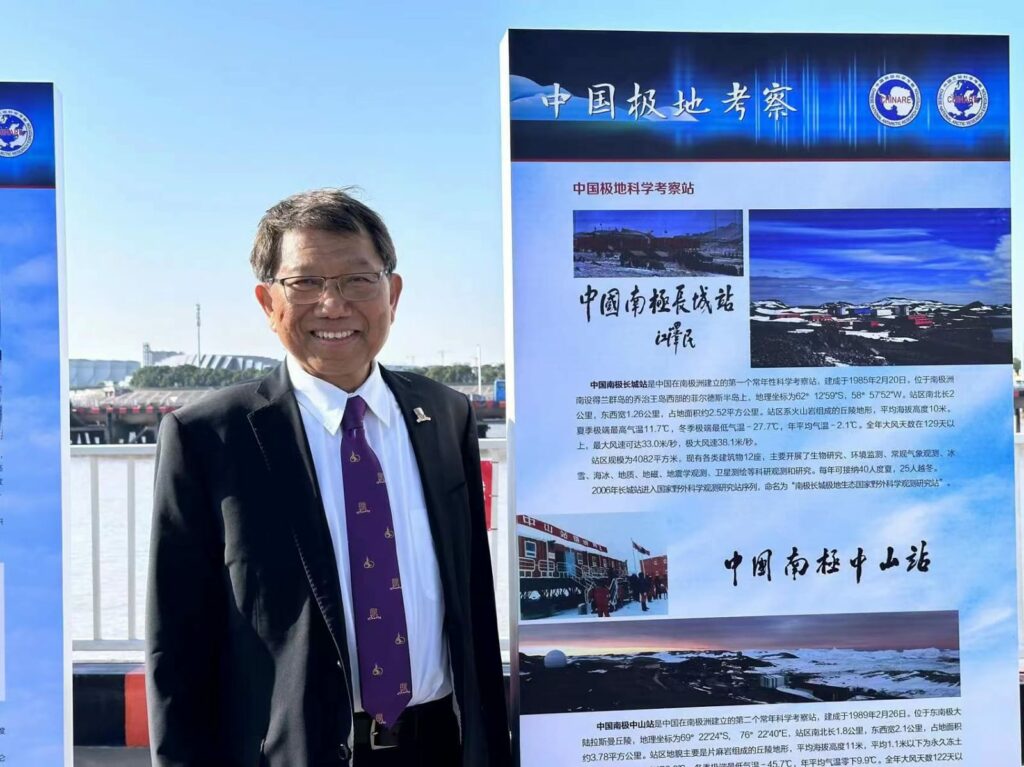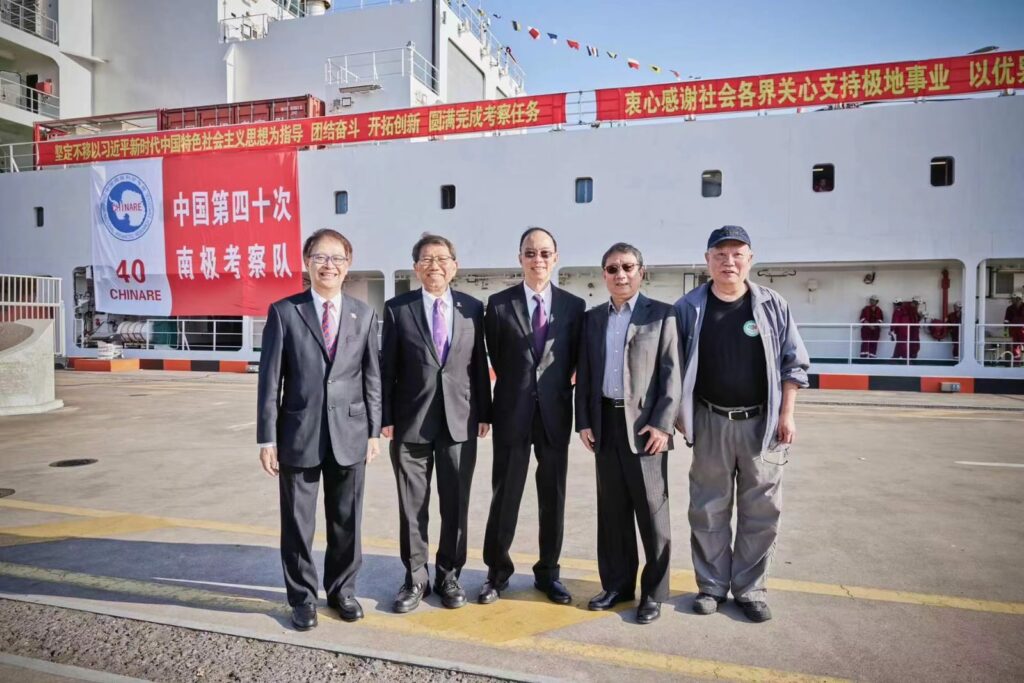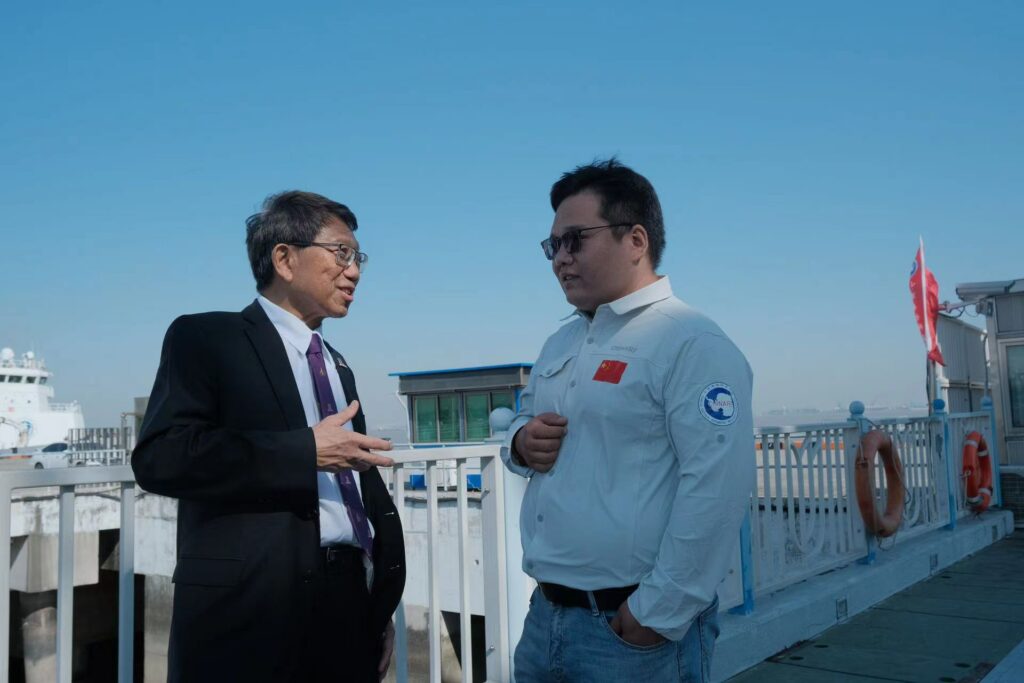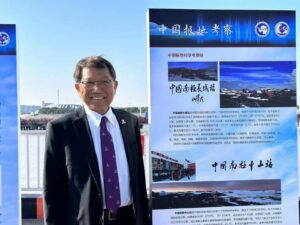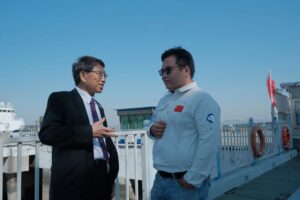CUHK
News Centre
CUHK representative invited to attend the launch of China’s 40th Antarctic scientific expedition
On the morning of 1 November 2023, the Ministry of Natural Resources and the Shanghai Municipal Government jointly held the launch event for China’s 40th Antarctic scientific expedition at the domestic base dock. Professor Rocky S. Tuan, Vice-Chancellor and President of The Chinese University of Hong Kong (CUHK), was invited to attend and witness this significant historical moment.
China’s 40th Antarctic scientific expedition team set sail on 1 November, starting a mission expected to last over five months and is expected to return in April 2024.
The expedition team comprises more than 460 researchers from over 80 domestic institutions and is being led by three ships, including two icebreakers Xuelong and Xuelong 2. The expedition departed tasked with conducting scientific research, carrying researchers and delivering basic supplies. The expedition will also include the cargo ship Tianhui, which left from the city of Zhangjiagang in east China’s Jiangsu Province which will transport construction materials for the new research station.
Attending on behalf of CUHK, Vice-Chancellor and President Professor Rocky S. Tuan extended his best wishes for the successful completion of the expedition and said: “We are honoured to witness the launch of China’s 40th Antarctic scientific expedition. A decade ago, CUHK established the world’s first museum focused on climate change — the Jockey Club Museum of Climate Change, offering exhibits and multimedia interactive exhibitions on climate change, so visitors can increase their awareness on sustainable development and environmental protection. A model of the Xuelong has always been a treasured item on display in the museum’s collection. CUHK’s invitation to this important event is testament to the recognition of our credentials in environmental research. We are absolutely committed to supporting the nation’s efforts in addressing climate change and protecting the planet’s precious marine resources”.
China’s 40th Antarctic Scientific Expedition will focus on three key tasks:
A new scientific research station will be established along the coastal areas of the Ross Sea during this expedition, becoming China’s fifth research station in Antarctica and its third permanent site after the Changcheng and Zhongshan stations, and will be the first facing the Pacific Ocean sector. The station will monitor and study the atmospheric and marine environment of Antarctica as well as the biological and ecological conditions and will support 80 expedition team members during summers and 30 members during winters.
Besides the construction of the new base, the expedition team will investigate the impacts of climate change on the Antarctic ecosystem. In the Prydz Bay, the Astronaut Sea, the Ross Sea in the west Antarctic, Amundsen Sea, and adjacent waters located near the Antarctic Peninsula, researchers will carry out comprehensive surveys and monitoring of biological ecology, the environments of water, sediment and atmosphere, as well as the distribution of pollutants.
The Kunlun, Zhongshan and Great Wall Stations will study the role of Antarctica in global climate change through monitoring of ecosystems and the environments of nearshore marine, soil, geology, atmosphere, snow and ice, and space.
International cooperation is also important to the mission. Cooperative research in the frontier fields of Antarctic science and the Enderby Land aerial survey with Norway, which is aimed at deepening understanding of ice-ocean bedrock interactions and ice sheet stability. The United States, the United Kingdom, Australia, Italy, South Korea, Russia and Chile will join other countries to cooperate on logistics support.

(From left) Professor Ho Kin-chung, Founder of the Polar Research Institute of Hong Kong. Professor Rocky S. Tuan, Vice-Chancellor and President of CUHK. Ma Fung-kwok, Member of the Hong Kong Legislative Council. Shen Dejun, Chairman of Shanghai Antarctic and Arctic Logistics Center. Wang Hailang, former Deputy Commander of the Xuelong 2 Icebreaker Construction Project


